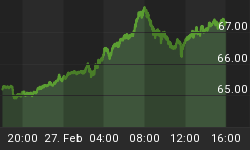When Money Dies: The Nightmare of the Weimer Hyperinflation, by Adam Fergusson, was published in 1975 and became a best-seller in 2010. Federal Reserve Chairman Ben S. Bernanke's claim that "inflation expectations are contained" is refuted (once again) by this 35-year, dust-gathering incident, unless the public took a sudden interest in multiplying millions, billions, and trillions - a "delirium of milliards" - the phrase of soon-to-be-assassinated Weimer government minister Walter Rathanau.
Interest in the German episode (which peaked in 1923) was described by Professor Peter Bennholz, University of Basle, and author of Monetary Regimes and Inflation: History, Economic, and Political Relationships, published in 2003, and not yet matching Fergusson's sales, but out-of-the-money call options on a spike might be worth exploring. Bernholz, studying all 29 hyperinflations in history, does so to "point our attention to the time from which the public tries to escape the loss of money by reducing its use by a flight into other currencies and commodities." For his study, Bernholz uses the "arbitrary convention" that hyperinflation "has reached in at least one month 50 percent or more." It is not necessary for inflation to approach that astounding level for major dislocations to occur.
Some characteristics of Weimer Germany are apparent in the United States. Parallel observations are sometimes less than they appear (e.g., in both cases, the people enjoyed eating meat), but are striking. The German incident happened over four years (also arbitrary. It can be argued that any year from 1914 to 1921 was the point of departure.)
Similarities to the U.S. have been in motion for 30 years or so. These include: (1) a high concentration of wealth among those who leverage, (2) the middle- and lower-classes falling behind, but not understanding or knowing it (or - knowing it but not allowing themselves to think about it), (3) the rise of a gambling culture, (4) including financial speculation on the stock exchange, which spread to all ranks of the population, (5) the blossoming of a financial industry, with quantity crushing quality (Weimer bank tellers became financial advisers since most people were at a loss, and would take any advice, which was often horrible, but probably well-intentioned), (6) the "striking displays of luxury beside poverty" (quoting Fergusson), (7) a "growing lack of concern for one's fellow man" (the difference between greed and the attempt to survive is blurred), (8) values are distorted, in both senses, the one feeding the other: a wife selling her husband's gold watch for four potatoes, (9) the quality of goods (and services) collapses (an evolution with consequences to morale and personal dignity), (10) the denial by the central bank that it is in any way attached to the inflation.
Adam Fergusson discussed When Money Dies with radio host Jim Campbell earlier in March. I will talk about current complexities this Sunday, March 27, 2011. See below for details.
Streaming Live on the Internet - Click on: http://wybcx.com/popup
"Business Talk with Jim Campbell"Sunday March 27th @ 10-11am Eastern
Fred Sheehan - Contrarian Fed Expert on "Quantitative Easing" & Fed Policies - Are they working and the Threat of Inflation?
Frederick J. Sheehan is the author of Panderer to Power: The Untold Story of How Alan Greenspan Enriched Wall Street and Left a Legacy of Recession (McGraw-Hill, 2009) and ![]() "The Coming Collapse of the Municipal Bond Market" (Aucontrarian.com, 2009)
"The Coming Collapse of the Municipal Bond Market" (Aucontrarian.com, 2009)















